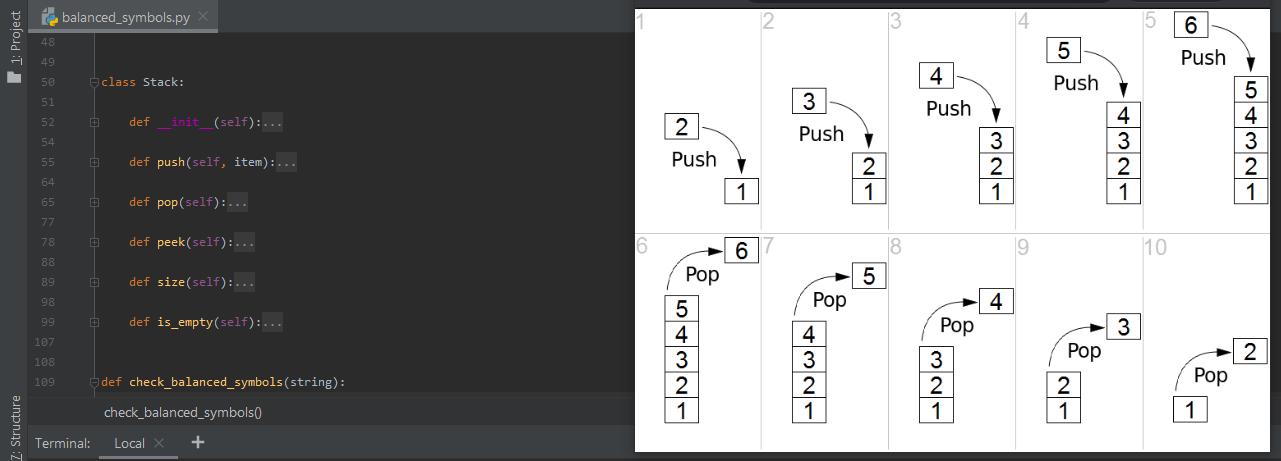Identify strings made of matching symbols
Let’s build a function that mimics what happens in the text editor when the linter is checking for whether or not you remembered to close all of your opening symbols. This function basically checks for the parentheses to be balanced, each opening parenthesis should also have a closing parenthesis, and the parentheses must be properly nested.
Question
Create a function that takes in a string of symbols as a parameter and returns True if the symbol string is balanced or False if it is not. In particular, the string should only contain opening and closing parentheses.
Examples
Here you can find and example of the input file, a list of words.
| input | output |
|---|---|
| ([]{}) | True |
| ([]{}()) | True |
| [[][][]] | True |
| (((()))) | True |
| ]{))[] | False |
| []{(((]} | False |
| ([{)(}]) | False |
| ({}][[) | False |
| ([a]) | False |
Hint: make use of a stack in your solution!
Lay out your structure
My favourite approach to solving this exercise is the following: fail fast.
In other words, I aim at returning False as soon as I hit a mismatch or an inconsistency, and if I manage to go through the entire input string then I return True.
Specifically, I am going to loop through each symbol of the input string and:
- in case it is an opening symbol, I push it onto the stack
- in case it is an ending symbol, I check if it matches the item at the top of the stack and:
- if they are a matching pair of symbols, then I remove the top symbol of the stack and move to the next symbol of the input string
- if they are not a matching pair of symbols, then I can immediately return False
The above process continues until all symbols of the input string are check and the stack is empty.
Also, as a quick consistency check, I am going to verify that the length of the input string is an even number - if that is not the case I will immediately return False.
As suggested by the hint, I am first going to implement a stack object.
Step 1: implement a stack
Let’s write down some code to implement a stack.
class Stack:
def __init__(self):
self.items = []
def push(self, item):
"""Accepts an item as a parameter and appends it to the end of the list.
Returns nothing.
The runtime for this method is O(1), or constant time, because appending
to the end of a list happens in constant time.
"""
self.items.append(item)
def pop(self):
"""Removes and returns the last item for the list, which is also the
top item of the Stack.
The runtime here is constant time, because all it does is index to the
last item of the list.
"""
if self.items:
return self.items.pop()
return None
def peek(self):
"""This method returns the last item in the list, which is also the item
at the top of the Stack.
This method runs in constant time because indexing into a list is done
in constant time."""
if self.items:
return self.items[-1]
return None
def size(self):
"""This method returns the length of the list that is representing the
Stack.
This method runs in constant time because finding the length of a list
also happens in constant time.
"""
return len(self.items)
def is_empty(self):
"""This method returns a Boolean value describing whether or not the
Stack is empty.
Testing for equality happens in constant time.
"""
return self.items == []
Step 2: write the function
Now we are ready to write our function following the instructions discussed above.
def check_balanced_symbols(string):
""""
This function verifies that the input string:
- only contains opening and closing parentheses
- is balanced, meaning each opening symbol has its corresponding closing symbol
- is ordered, meaning each opening symbol precedes its corresponding closing symbol
In case the above conditions are met, the functions returns True, otherwise it returns False.
"""
matching_symbols_dict = {
'(': ')',
'[': ']',
'{': '}'
}
allowed_characters = list(matching_symbols_dict.keys()) + list(matching_symbols_dict.values())
if len(string) % 2 != 0:
return False
if all(c in allowed_characters for c in string):
my_stack = Stack()
for c in range(len(string)):
if string[c] in matching_symbols_dict.keys():
my_stack.push(string[c])
else:
if my_stack.is_empty():
return False
elif matching_symbols_dict[my_stack.peek()] == string[c]:
my_stack.pop()
else:
return False
if my_stack.is_empty():
return True
else:
return False
else:
return False
Step 3: run the tests
Let’s check if the function works as expected.
We can perform manual checks via prompt by letting the user define a string and test it. Here is the code for it.
input_string = input("Type the string of symbols to check: ")
print("The string you typed is:", input_string)
print("Is the above string made of balanced symbols?", check_balanced_symbols(input_string))
And here an example of this check.
Type the string of symbols to check: [][](({})[])
The string you typed is: [][](({})[])
Is the above string made of balanced symbols? True
Alternatively, we can check all strings contained in a list and verify the expected result. Here is the code for it.
strings_to_test = ['([]{})', '([]{}())', '[[][][]]', '(((())))', ']{))[]', '[]{(((]}', '([{)(}])', '({}][[)', '([a])']
strings_expected_result = [True, True, True, True, False, False, False, False, False]
for s, r in zip(strings_to_test, strings_expected_result):
print("Input string to test:", s)
print("Expected result for string:", r)
print("Actual result for string:", check_balanced_symbols(s))
print("-" * 50)
And here is the output for your reference.
Input string to test: ([]{})
Expected result for string: True
Actual result for string: True
--------------------------------------------------
Input string to test: ([]{}())
Expected result for string: True
Actual result for string: True
--------------------------------------------------
Input string to test: [[][][]]
Expected result for string: True
Actual result for string: True
--------------------------------------------------
Input string to test: (((())))
Expected result for string: True
Actual result for string: True
--------------------------------------------------
Input string to test: ]{))[]
Expected result for string: False
Actual result for string: False
--------------------------------------------------
Input string to test: []{(((]}
Expected result for string: False
Actual result for string: False
--------------------------------------------------
Input string to test: ([{)(}])
Expected result for string: False
Actual result for string: False
--------------------------------------------------
Input string to test: ({}][[)
Expected result for string: False
Actual result for string: False
--------------------------------------------------
Input string to test: ([a])
Expected result for string: False
Actual result for string: False
--------------------------------------------------
Conclusions
I hope you found this post useful - I would love to hear from you what you think about my python script.
Did you manage to find an alternative, perhaps more efficient, solution?
Also, please share with me one coding challenge you had to face recently! :)
~Giuseppe

